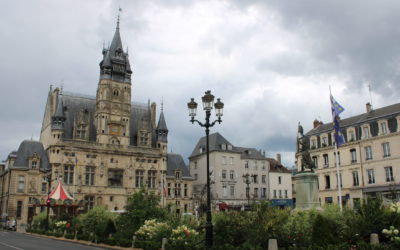Arverne Group to Develop Geothermally Powered District Heating Network in Île-de-France • La Chapelle-d’Aligné to Implement Wood-Fired Heating System • Lyon Metropole President Puts the Region’s District Heating Strategy Under the Spotlight • Read more about the developments in sustainable heating and cooling in this month's news update from France
Arverne Group has been selected by the municipalities of Clichy-sous-Bois and Livry-Gargan, in collaboration with Dalkia and Île-de-France Energies & Territoires, to develop and operate a new low-carbon district heating network. The initiative will involve the construction of a geothermal heating system that will serve both cities. Once completed, the network will span 26 kilometres by 2031 and will have a production capacity of 115 GWh per year. The existing infrastructure is to be updated, and new equipment will be installed to extend the network’s coverage to additional neighbourhoods.
The project aims to cut carbon emissions by 20 000 tonnes annually, which is roughly equivalent to removing around 10 000 vehicles from the road. Additionally, residents are expected to benefit from lower energy costs, with an estimated 50% reduction in bills anticipated to begin on 1 July.
The €90 million project, supported by ADEME and the Île-de-France Region, will be implemented under a 30-year concession. Arverne Group will oversee the geothermal studies, drilling, and maintenance of the system through its subsidiaries, 2Gré and Arverne Drilling Services. Pierre Brossollet, CEO of Arverne Group, stated that the project underscores the role of geothermal district heating networks in supporting the energy transition, emphasising the importance of developing sustainable infrastructure and enhancing energy efficiency.
Read more in article from Les Echos
La Chapelle-d’Aligné has announced plans to install a wood-fueled district heating system to improve energy efficiency and reduce costs. The project, presented by Mayor Philippe Deslandes during the town’s New Year’s ceremony on January 11, 2025, will provide heating for several public buildings, including the school, school cafeteria, town hall, and an adjacent residential building, using a pellet boiler.
The decision to move forward with the heating system is in line with current subsidy policies, which prioritise projects that aim to decrease carbon emissions and reduce fossil-fuel dependence. Deslandes explained that while the current boiler is still functioning, it will eventually need to be replaced, and an oil-based system will no longer be a viable option. The project is expected to cost €230 000, with funding support of €99 000 from the French Agency for Ecological Transition and €46 000 from the Equipment Grant for Rural Areas, in total covering over 60% of the total cost.
In addition to the heating system upgrade, the local school will undergo renovations estimated at €300 000, with €67 000 in funding from the Green Fund and €35 000 from the Regional Council, covering approximately half of the expenses.
Read more in article from Ouest France
On Friday January 17 the president of the Lyon Metropolitan Area, Bruno Bernard, addressed the media, discussing key policy directions and the region’s district heating strategy. During his remarks, he revisited the recent decision to abandon plans for a large wood-fueled heating plant in Sainte-Foy-lès-Lyon, which was initially intended to supply the district heating network in western Lyon. Instead, the network will now rely on residual heat from the Solvay industrial facility in Collonges.
The decision was influenced by local political developments, including the upcoming mayoral election in Francheville. Wood-fueled heating systems also faced opposition from the activist group “Stop Enfumage,” which has argued against wood-based heating due to concerns over emissions of fine particles.
Bernard nevertheless emphasized the positive impact of district heating, particularly following the 2023 ban on open-fire wood heating in individual households. He noted that 3 500 households had been supported in transitioning away from this heating method and highlighted the economic and environmental benefits of district heating. According to him, connecting buildings to these networks, whether the heat source is an incinerator, a biomass plant, or another system, consistently delivers advantages.
He also pointed to the significant expansion of network connections, reporting that the number of homes linked to district heating systems had increased from 90 000 in 2020 to a projected 200 000 by 2026-2027. Bernard reiterated that waste heat recovery remains the most effective solution, followed by geothermal energy where feasible, with wood heating considered a last resort. He also underscored the efficiency of modern filtration technology in heating plants and expressed confidence in the availability of forest resources within a 100-kilometer radius of Lyon.
Read more in article from Mes Infos
To stay updated on news for sustainable heating and cooling, follow us on LinkedIn, and subscribe to our Newsletter.
Sweden is at the forefront of decentralised heat networks technology. Our aim for “Sustainable Heating & Cooling by Sweden” is to facilitate knowledge sharing between British, French and Swedish stakeholders and develop and encourage environmental and economic best practice.
To find out how we can help you and your organisation, please contact our London or Paris-based “SHC” teams. We can introduce you to leading consultants, suppliers of technology and services who will be pleased to share know-how of the development of sustainable heating & cooling solutions.


